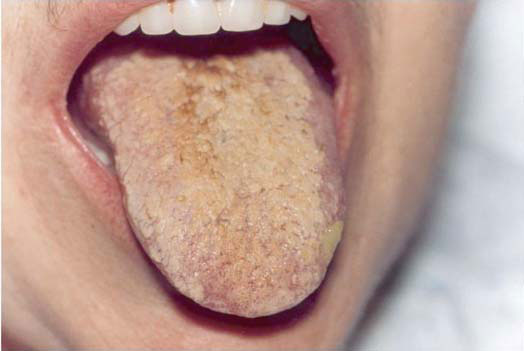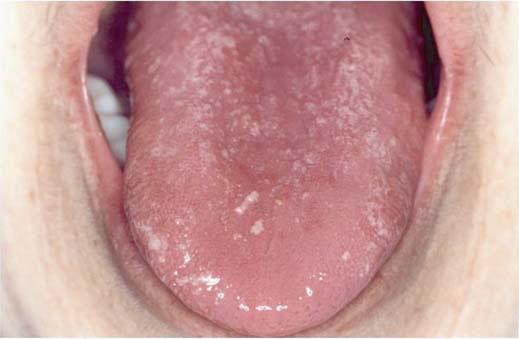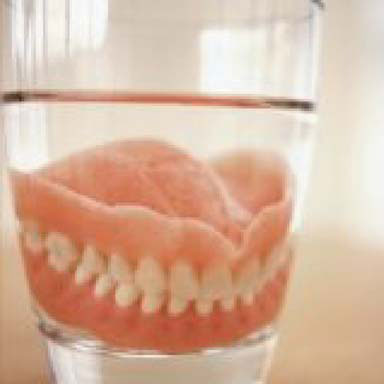Oral hygiene
The importance of providing regular oral care cannot be overstated. Oral hygiene measures should be performed at least twice a day, if they are to benefit the patient.
The single most important measure is brushing the teeth. A small headed brush, with medium texture nylon filament bristles, is recommended. Soft toothbrushes can be used for patients whose mouths are particularly sore. Patients should be encouraged to use toothpaste containing at least 1000 ppm fluoride. For patients who have difficulty rinsing their mouths or swallowing and are at increased risk of aspiration, a non- foaming alternative such as chlorhexidine gluconate gel should be used. Water alone is acceptable for those who cannot tolerate toothpaste.
For very debilitated patients, chemical plaque control may be helpful. The most effective antiplaque agent is chlorhexidine, which should be used no more than twice daily. Chlorhexidine will not remove established plaque so the mouth should be thoroughly cleaned, ideally by a dentist or dental hygienist, before regular use of chlorhexidine to maintain a plaque-free environment. Chlorhexidine is used most commonly as a 0.2% mouthwash (10 ml twice a day) but is also available as a 1% gel and a 0.2% spray.
Denture hygiene
Dentures are readily colonised by microorganisms so it is essential that a high level of denture hygiene is maintained. Denture care must be carried out at least once a day, preferably at night. All dentures, both partial and complete, must be cleaned outside the mouth and the soft tissues of the mouth and standing teeth cleaned separately. Dentures should always be cleaned over a bowl of water, so that if dropped they will not be damaged. Commercial products are available for cleaning dentures, but household soap, or just water alone, is satisfactory. Ordinary toothpaste should not be used because it is too abrasive. The denture should be rinsed well before re-insertion.
Prevalence of oral problems in studies involving palliative care patients with cancer
| Problem | Prevalence (%) |
| Oral symptoms | |
| Dry mouth | 58–78 |
| Oral discomfort | 33–55 |
| Taste disturbance | 26–44 |
| Difficulty chewing | 23–52 |
| Difficulty swallowing | 23–37 |
| Difficulty speaking | 31–59 |
| Halitosis | 48 |
| Oral infections | |
| Oral candidosis | 8–83 |
| Dental caries | 20–35 |
| Periodontal disease | 36 |

This patient had a drug induced dry mouth, which resulted in poor oral hygiene, halitosis, and oral candidosis: the oral symptoms led to low mood, while the halitosis led to limited physical contact between the patient and her family

The same patient as above. Her mouth dramatically improved when she was treated with a saliva stimulant
Dentures should be left out of the mouth at night. Plastic dentures should be soaked overnight in a dilute solution of sodium hypochlorite (such one part 1% Milton to 80 parts water). This allows disinfection of the denture and reduces the likelihood of denture stomatitis (see below). The denture should be rinsed well under running water before being returned to the patient’s mouth. Dentures with metal parts should be soaked in chlorhexidine gluconate (0.2% solution) to achieve disinfection. Dentures should be stored in a denture container clearly marked with the patient’s name. Dentures themselves can also be marked with the patient’s name.
Oral symptoms
Dry mouth (xerostomia)
Xerostomia may be caused by a reduction in the secretion of saliva, a change in the composition of saliva, or a combination of these factors.
Xerostomia is associated with several other oral symptoms and problems, including oral discomfort, disturbance in taste, difficulty chewing, difficulty swallowing, difficulty speaking, difficulty in retaining dentures, dental caries, oral candidosis, and other oral infections. The various manifestations of xerostomia reflect the multiple functions of saliva.
The management of xerostomia involves treatment of the underlying cause and use of saliva stimulants or use of saliva substitutes. The choice of symptomatic treatment will depend on several factors, including the aetiology of the xerostomia, the patient’s general condition, the presence or absence of teeth, and, most importantly, the patient’s preference.
There are good theoretical reasons for prescribing saliva stimulants rather than saliva substitutes. Furthermore, in the studies that have compared both, patients have generally preferred the saliva stimulants. The management of dry mouth also involves oral hygiene measures and the use of fluoride supplements.
Acidic products are relatively contraindicated in dentate patients and should be used with caution in edentulous patients. A low pH predisposes to dental erosion, dental caries, and oral candidosis. It should be noted that some of the artificial salivas are acidic in nature.
Oral discomfort and pain
A dry mouth, poorly fitting dentures, intraoral diseases (malignant, infectious), local radiotherapy, and systemic chemotherapy can all cause oral discomfort in patients in palliative care. The strategies used to manage oral discomfort include treatment of the underlying cause, topical analgesics (local anaesthetics, other agents), and systemic agents.
Taste disturbance
Similarly, there are several potential causes of taste disturbance, including dry mouth, intraoral diseases (malignant, infectious), local surgery, local radiotherapy, systemic chemotherapy, drug treatment, and zinc deficiency.
Halitosis
Halitosis may be “physiological” (no underlying disease present) or “pathological” (underlying disease present). Physiological halitosis results from the bacterial putrefaction of food, epithelial cells, blood cells, and saliva; the process occurs mainly on the dorsal surface of the tongue. This is the most common type of halitosis. Pathological halitosis usually results from disease of the oral cavity but may also be associated with disease of the respiratory or gastrointestinal tract or a systemic metabolic problem. There are several strategies for the management of physiological halitosis; the management of pathological halitosis involves treatment of the underlying disease.

Stay updated, free articles. Join our Telegram channel

Full access? Get Clinical Tree








